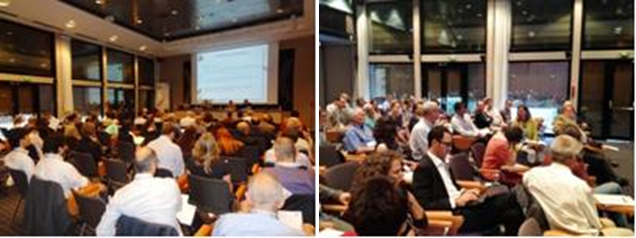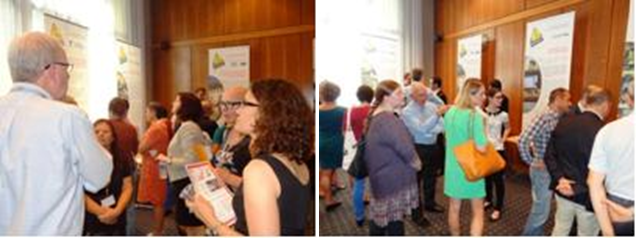The final conference of the European RESTRAIL project (Reduction of Suicides and Trespasses on Railway property) was held to present the lessons learnt within the project, its final results and the future way forward.
The European RESTRAIL (Reduction of Suicides and Trespasses on RAILway property) project was brought to a close on September 18th 2014 at the UIC premises at Paris, France. This was the occasion to learn more about this successful project, its results and the future way forward. Around 100 participants from Europe as well as other countries (such as USA and Australia), attended the final conference of this European project. RESTRAIL aimed at reducing the occurrence of suicides and trespasses on railway property and the costly service disruption caused by these events. One central objective of RESTRAIL was to provide the rail industry with the analysis of cost-effective prevention and mitigation measures as well as with recommendations and guidance materials to optimise the implementation of these measures. The final outcome is a toolbox to support the decision makers in taking practical steps to reduce suicides and trespasses and to mitigate the consequences once that these events occur.Mr Jean-Pierre Loubinoux, UIC Director-General, delivered the opening speech of these conferences, highlighting the role of different experts working together on both societal and technical issues focused on the reduction of trespassing and suicides. Afterwards, Mrs Ann Billiau, INFRABEL General Director, gave a keynote focused on an example from Belgium, explaining that it has the more dense and heavy network in the world with easily accessible tracks and thus dramatic consequences. Mrs Billiau referred to the toolbox as a dynamic and evolutionary tool, where stakeholders could find a general guidance explaining how to analyse the measures and their implementation.

The Conferences followed through with the WP leaders’ presentations about different lessons learnt during the project referred to:
- Qualitative analysis of suicide and trespasses on railway property
- Assessment of measures targeted to reduce railway suicides and trespasses.
- Mitigation of Consequences by Improving Procedures and Decision Making
- Implementation and monitoring process of field tests
After these presentations, the most anticipated moment came with the Poster session. The results, obtained from each one of the evaluations, were presented by the responsible RESTRAIL partners. A total of 11 posters were shown during one and a half hour. The eleven evaluated measures were: warning signs and posters; societal collaboration to prevent railway suicide; gatekeeper training course for personnel working in a railway environment; gatekeeper course “Contact with a (possibly) suicidal person»; restriction of access to fast lines, using mid-platform fencing and other restrictions to access; education in schools for 8–11 year old children; video enforcement and sound warning; railway safety education programme¸ a combination of measures at Aydin station; Computer Based Training (CBT) Module for Responding Bodies to mitigate post-incident consequences and Forward Facing CCTV. CIDAUT presented the results obtained from the evaluation carried out together with ADIF at the stopping place of the University of Valladolid (Valladolid, Spain); where several warning signs and posters were implemented in order to know their effectiveness on the reduction of trespassers.

After the Poster session; the RESTRAIL toolbox was presented as the final output of the project. This guidance material has been designed in order to:
- Lead decision-makers through the process of selecting from the wide range available of preventative and mitigation measures
- Provide more detailed guidance on the implementation of those measures and provide a framework for collecting and structuring information in order to feed an accessible and documented database on implementation measures and efficiency across the rail community.
More information referred to this RESTRAIL toolbox is accessible at http://www.restrail.eu/toolbox/
Lastly, the Conferences concluded with an open discussion of some ideas concerning possible follow-up research activity. One of the most appreciated by those present was initiating new and more elaborated field tests in the future: some of the most promising measures could be selected and evaluated in longer field tests, in order to collect more reliable data and assess the beneficial effect achieved statistically.
The RESTRAIL project ended on September 30th, 2014, however the partners will continue to work together and organize periodic workshops, so that current and future partners can share the most recent knowledge and best practices from their countries.
For more information on the RESTRAIL project, please visit http://www.restrail.eu/ or contact juapla@cidaut.es.